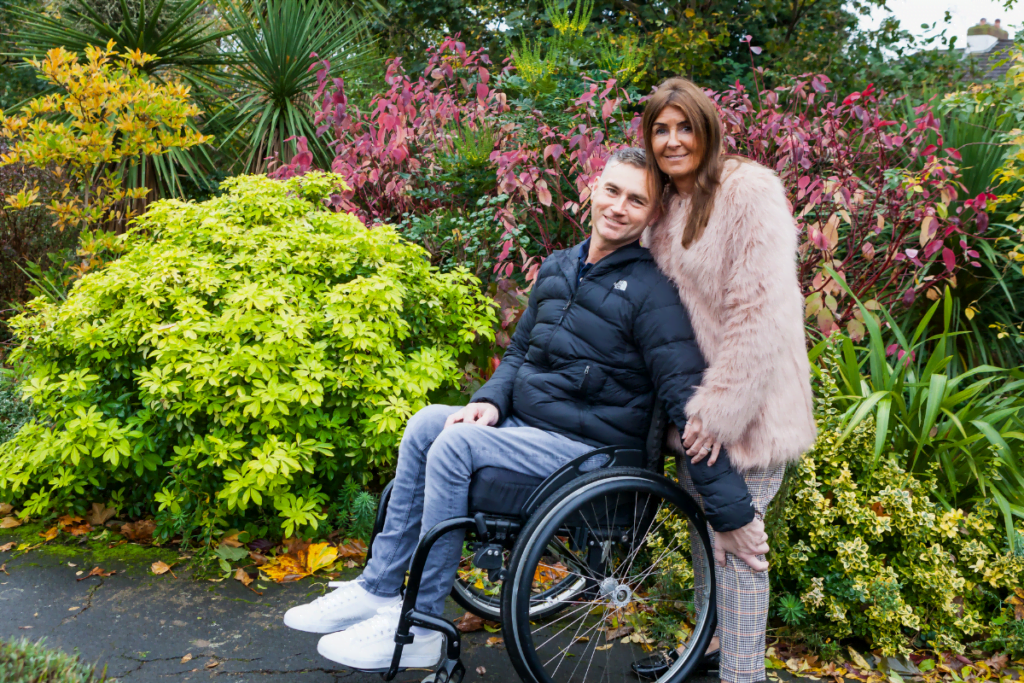Wellbeing after spinal cord injury
5 May 2021

Taking care of your wellbeing after spinal cord injury is vital. Back Up’s services are provided by people affected by spinal cord injury themselves, so we understand the importance of wellbeing after spinal cord injury very well.
As part of our recent “What Next?” course, we shared vital tips for wellbeing, alongside some quotes from our team and the people we support. Read on to discover some of these top tips, and learn how Back Up can support you and your loved ones after spinal cord injury.
Get active
Regular exercise and activity can make a massive difference. It can help you physically, as well as mentally, by reducing stress. Our signposting article has some links to disabled sports organisations which you may find a useful starting point.
“Fitness, long pushes and wheelchair rugby training – these all help me to distance myself from my frustrations and focus on other things.”
Get creative
Keeping yourself active doesn’t just mean sports and exercise. Creative pursuits can help your wellbeing after spinal cord injury. This can include painting, gardening, yoga, reading, or whatever hobbies you enjoy. It’s worth finding time to take part in activities you enjoy, even if you are busy or overwhelmed. Taking time out to look after yourself is so important, particularly if a good way of dealing with stress.
If you need advice on finding a creative output after spinal cord injury, why not talk to our community? Our Back Up Lounge, a Zoom forum for people affected by spinal cord injury, hosts a space for people in your situation to discuss arts, books, and gardening.
“I try to keep a good balance in life with work, family time and my own free time. Just finding that balance between everything is huge for me.”
Get healthy
Looking after your health is key to wellbeing. This goes beyond exercising and looking after your mental health. You may have more health issues to consider than before your injury. . You may need to adopt a new bladder and bowel routine, or regularly check your skin for pressure ulcers. It’s important to never neglect your physical health after spinal cord injury, despite the additional challenges you may be facing.
We have a guide to bladder and bowel care, which covers topics such as preventing UTIs, catheter usage, and healthy eating. We also have a section dedicated to skin care, so you can learn expert tips for preventing pressure ulcers.
If you find these new routines frustrating, or if something goes wrong, remember you are not alone. There are plenty of other people affected by spinal cord injury who understand what you’re going through.
“It can be tough if a bad day is injury-related. It might be a bladder/bowel thing or a bad spasm day, but you just need to say to yourself, ‘I can deal with this. Take a breather. Move on.’ It can be quite tricky but it’s important to remember that these things don’t define you.”
Get advice
Every spinal cord injury is as unique as the person who sustains it. There is often no “one size fits all” approach to the problems you may be facing. That’s why it may be a good idea to connect with someone else who has gone through a similar situation.
Social media could be a good place to start. You can connect with the Back Up community on Facebook, Twitter, and Instagram. There are also dedicated community groups such as the SCI Owner’s Club on Facebook. If you enjoy podcasts, “This is Spinal Crap” have many episodes discussing issues related to spinal cord injury.
It’s good to hear first-hand advice, and apply what works best for you.
“Cherry-pick everyone’s advice and opinions. Try things out and see what works for you.”
Get support
Back Up offers a wide range of support services for people affected by spinal cord injury. You can find a community in our fortnightly Back Up Lounge, get paired up with a trained volunteer mentor, or learn wheelchair skills using our app. These are only a few examples of what we do, so if you need support after spinal cord injury you can register for support and one of our team will be in touch with you.
· “The services that Back Up offer are so important. They lead to meeting other people in similar situations, having a social life with people who understand what you’ve been through, and having access to a vital support network.”

